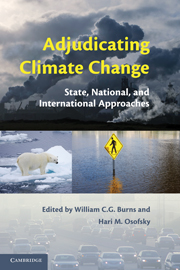Book contents
- Frontmatter
- Contents
- Foreword
- Acknowledgments
- Adjudicating Climate Change
- 1 Overview: The Exigencies That Drive Potential Causes of Action for Climate Change
- PART I SUBNATIONAL CASE STUDIES
- 2 State Action as Political Voice in Climate Change Policy: A Case Study of the Minnesota Environmental Cost Valuation Regulation
- 3 Litigating Climate Change at the Coal Mine
- 4 Cities, Land Use, and the Global Commons: Genesis and the Urban Politics of Climate Change
- 5 Atmospheric Trust Litigation
- PART II NATIONAL CASE STUDIES
- PART III SUPRANATIONAL CASE STUDIES
- 17 Conclusion: Adjudicating Climate Change across Scales
- Index
- References
2 - State Action as Political Voice in Climate Change Policy: A Case Study of the Minnesota Environmental Cost Valuation Regulation
Published online by Cambridge University Press: 25 August 2009
- Frontmatter
- Contents
- Foreword
- Acknowledgments
- Adjudicating Climate Change
- 1 Overview: The Exigencies That Drive Potential Causes of Action for Climate Change
- PART I SUBNATIONAL CASE STUDIES
- 2 State Action as Political Voice in Climate Change Policy: A Case Study of the Minnesota Environmental Cost Valuation Regulation
- 3 Litigating Climate Change at the Coal Mine
- 4 Cities, Land Use, and the Global Commons: Genesis and the Urban Politics of Climate Change
- 5 Atmospheric Trust Litigation
- PART II NATIONAL CASE STUDIES
- PART III SUPRANATIONAL CASE STUDIES
- 17 Conclusion: Adjudicating Climate Change across Scales
- Index
- References
Summary
INTRODUCTION
As the debate over global warming intensified during the Bush administration, state legislatures in the United States adopted regulations that conveyed their discontent with the failure of the national government to regulate carbon dioxide emissions adequately or to adopt the Kyoto Protocol. Even with the Obama administration's efforts at greater federal regulation, state activity continues. These subnational efforts by states range in stringency but often stop short of substantive regulation that burdens in-state business interests. Such weak or “symbolic” regulation nonetheless plays an important role in the global climate change debate by fostering political voice, creating a threat of future regulatory action, and legitimating climate change as a legally redressable harm. An individual state cannot make a significant impact on atmospheric carbon dioxide levels or arrest global warming. However, carbon dioxide regulation by states can make a strong statement about the political will to address global warming – a statement that has grown louder as individual state legislation encourages other states to act and in turn brings pressure to bear upon the federal government.
There has been increasing interest among state policymakers in regulatory models that force polluting entities to internalize the societal costs of their carbon dioxide emissions. Electricity generation, which is responsible for 38% of U.S. carbon dioxide emissions, has been one target of state regulatory efforts.
- Type
- Chapter
- Information
- Adjudicating Climate ChangeState, National, and International Approaches, pp. 31 - 47Publisher: Cambridge University PressPrint publication year: 2009
References
- 1
- Cited by



